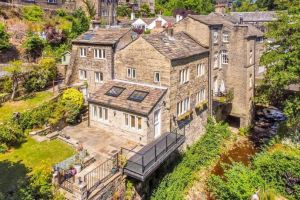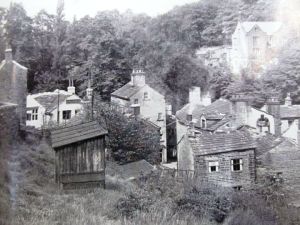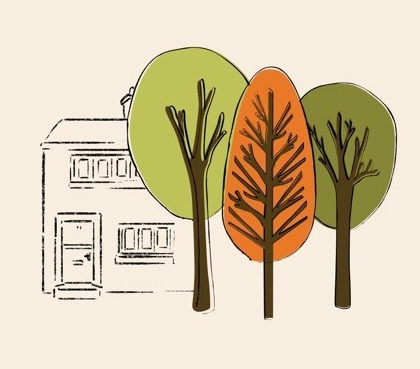The Coach House: Difference between revisions
Created page |
PhilRadford (talk | contribs) |
||
| (46 intermediate revisions by 3 users not shown) | |||
| Line 1: | Line 1: | ||
[[File:CoachHouse 2022.jpg|thumb]] | |||
===Formerly 10, 11 and 12 High Street=== | |||
Although now one home, The Coach House was orignally three homes - numbers 10, 11 and 12 High Street. The change of name was offically approved by Calderdale Council 27/11/1991 | |||
Like [[The Lord Nelson Inn]], a building was shown here on the Saxton map of 1599. | Like [[The Lord Nelson Inn]], a building was shown here on the Saxton map of 1599. | ||
[[File:CoachHouseFromHighStreet.jpg|thumb]] | |||
The present building dates partly from the mid-18th and early 19th centuries, and was originally a coach house and stables. | The present building dates partly from the mid-18th and early 19th centuries, and was originally a coach house and stables. | ||
The | The dwelling has an L-shape plan. No. 10 (the original coach house) has a coach house door at the rear. Both 10 and 11 have 4 light windows downstairs and 3-light windows upstairs. No. 12 was originally a cottage and is at right angles to No. 10, and connected to No. 11. | ||
Number 10 is the oldest part, and contains a good example of Cruck Beams [[https://en.wikipedia.org/wiki/Cruck]]. | |||
===House(s) Ownership=== | |||
Edson Patrick (born 1886) declared in 1974 that he owned 8,9,10,11 and 12 High Street and the yard known locally as Patrick's Yard. Edson married Emily Binns. Edson died in May 1984. | |||
In May 1974, Patrick sold the yard and the cottages at 10, 11, and 12 High Street to Bryan Joseph Davenport (of 20 Halifax Lane, Luddenden) for the sum of £18,000 | |||
Bryan Davenport was awarded a grant to renovate 10 & 11 High Street. The estimated cost of repair was £9075. A grant was award by Calderdale Metropolitan Borough of £2500. That being 50% of the maximum grant amount available. | |||
In February 1980, Bryan Davenport and Annette Bullock sold the properties to Gordon and Christine Ackroyd for the sum of £29,000. | |||
Barry & Margaret Dyson bought the house in March 1991 from Gordon & Christine Ackroyd. Shortly afterwards, the Dysons purchased the land to the south of the house and the land between the house and the Lord Nelson Inn from Mr & Mrs Wormald. | |||
Kevin Murrell & Stephen Parker bought the coach house and associated land in March 2023 from Barry Dyson. | |||
To be completed... | |||
===House(s) Occupation=== | |||
{| class="wikitable" | |||
|+ | |||
|- | |||
! House !! 1901 Census !! 1939 Census !! Current Residents | |||
|- | |||
| 8 & 9 High St|| Example || Patrick, William (Retired paper maker) & Leah (housewife unpaid), and son Edson (Grocer)|| Example | |||
|- | |||
| 10 High St|| Example || Hardy, Mary (Unpaid domestic duties)|| Example | |||
|- | |||
| 11 High St|| Example || Green, John (Coach and Motor Painter) & Effie (Unpaid domestic duties)|| Example | |||
|- | |||
| 12 High St|| Example || Patrick, Winifred (Daily Help Paid) | |||
|| Example | |||
|} | |||
===Listing=== | |||
The Coach House is listed Grade II, for two reasons: | |||
# The original coach house entrance way, now fully glazed but clearly visible, and | |||
# A particularly fine example of Cruck Beams [[https://en.wikipedia.org/wiki/Cruck]] in the attic. | |||
[[ | [[Listed Buildings #Nos. 10, 11 and 12 (formerly listed as No. 10 and 11) The Coach House| see here for the full details from the National Heritage Listing]] | ||
Latest revision as of 16:50, 14 November 2025

Formerly 10, 11 and 12 High Street
Although now one home, The Coach House was orignally three homes - numbers 10, 11 and 12 High Street. The change of name was offically approved by Calderdale Council 27/11/1991
Like The Lord Nelson Inn, a building was shown here on the Saxton map of 1599.

The present building dates partly from the mid-18th and early 19th centuries, and was originally a coach house and stables.
The dwelling has an L-shape plan. No. 10 (the original coach house) has a coach house door at the rear. Both 10 and 11 have 4 light windows downstairs and 3-light windows upstairs. No. 12 was originally a cottage and is at right angles to No. 10, and connected to No. 11.
Number 10 is the oldest part, and contains a good example of Cruck Beams [[1]].
House(s) Ownership
Edson Patrick (born 1886) declared in 1974 that he owned 8,9,10,11 and 12 High Street and the yard known locally as Patrick's Yard. Edson married Emily Binns. Edson died in May 1984.
In May 1974, Patrick sold the yard and the cottages at 10, 11, and 12 High Street to Bryan Joseph Davenport (of 20 Halifax Lane, Luddenden) for the sum of £18,000
Bryan Davenport was awarded a grant to renovate 10 & 11 High Street. The estimated cost of repair was £9075. A grant was award by Calderdale Metropolitan Borough of £2500. That being 50% of the maximum grant amount available.
In February 1980, Bryan Davenport and Annette Bullock sold the properties to Gordon and Christine Ackroyd for the sum of £29,000.
Barry & Margaret Dyson bought the house in March 1991 from Gordon & Christine Ackroyd. Shortly afterwards, the Dysons purchased the land to the south of the house and the land between the house and the Lord Nelson Inn from Mr & Mrs Wormald.
Kevin Murrell & Stephen Parker bought the coach house and associated land in March 2023 from Barry Dyson.
To be completed...
House(s) Occupation
| House | 1901 Census | 1939 Census | Current Residents |
|---|---|---|---|
| 8 & 9 High St | Example | Patrick, William (Retired paper maker) & Leah (housewife unpaid), and son Edson (Grocer) | Example |
| 10 High St | Example | Hardy, Mary (Unpaid domestic duties) | Example |
| 11 High St | Example | Green, John (Coach and Motor Painter) & Effie (Unpaid domestic duties) | Example |
| 12 High St | Example | Patrick, Winifred (Daily Help Paid) | Example |
Listing
The Coach House is listed Grade II, for two reasons:
- The original coach house entrance way, now fully glazed but clearly visible, and
- A particularly fine example of Cruck Beams [[2]] in the attic.
see here for the full details from the National Heritage Listing
